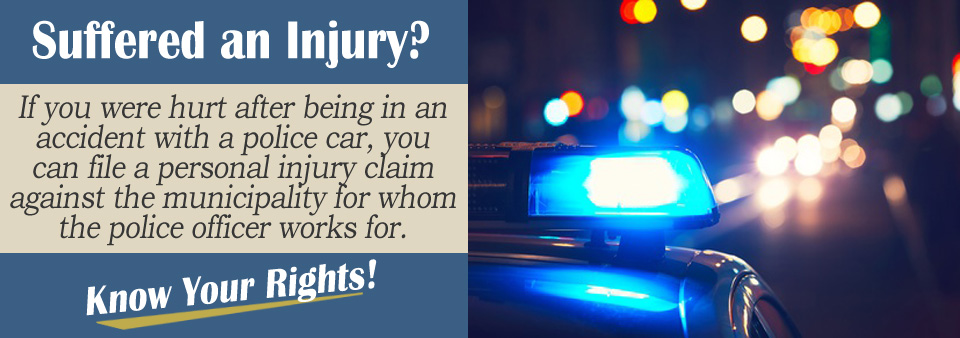Table of Contents
- Employee Liability
- Suing the Government
- What Kind of Compensation Can You Get After Getting Hit By a Police Car?
- How To Prove The Police Car Was at Fault?
- What Damages Could Happen To Your Vehicle In a Collision With A Police Car?
- The Process and Importance of Hiring an Attorney
- Speak With a Personal Injury Attorney
- Additional Resources
Being in a car accident is bad enough, but being in a car accident where the offending driver is a government employee is even worse. When a government employee, such as a police officer, is involved, liability is not black and white.
Who do you sue: the driver or the “employer,” i.e., the municipality? It is not always easy determining how to proceed.
Employee Liability
In most situations, if the police officer who hit you is driving and acting within his or her scope of employment, you cannot pursue the employee for liability but rather the employer. When it comes to a police officer, the employer would be the municipality for whom the police officer works.
Only a handful of situations apply where it can be shown that the employee is not acting within his or her scope of employment, such as when the officer is being negligent or using the government vehicle for personal activities, and in those situations, then you would not pursue damages against the municipality.
Suing the Government
The problem is, suing a governmental entity comes with its own issues. It can be difficult to sue the government, though it is not impossible. In fact, in past years, it was barred under the doctrine of sovereign immunity, which means the government cannot be sued without its consent.
Whenever a federal government employee is involved, liability is governed under the Federal Tort Claims Act (FTCA). Most states have their own Torts Claim Act, which provides a waiver for the doctrine of government sovereign immunity and allows damages to be pursued against the responsible governmental entity.
What Kind of Compensation Can You Get After Getting Hit By a Police Car?
If you are hit by a police car you can receive compensation for:
- Medical bills
- Loss of earnings if you cannot work
- Medical expenses that are not covered by insurance
- Money for the damages to your car
- Money for a new car if it is totaled
If you are hit by a police car you should always get checked by a medical professional even if you have no visible injuries. Head, neck, and back injuries can be caused by getting hit at a high rate of speed and injuries like that may get worse over time. You could develop chronic back, head, and neck problems that make it difficult to work later on and you will need medical documentation of any injury in order to be compensated for it.
How To Prove The Police Car Was at Fault?
The damage to your car will tell a story of how the police car hit your car, but in order to prove that it was a police car that hit your car you need to find out if there is dashcam footage of the crash or surveillance video from traffic cameras that show the crash. All police vehicles have dashboard cameras that are required to be recording when the police are on duty so there should be video of the crash although you may have to file a request for the video with the police department.
If the accident occurred in an area where there are traffic cameras you or your attorney can file a request with the city for the camera footage showing the crash. If there are bystanders who witness the crash you can also collect witness statements to help prove that the police car was at fault.
A fast way to get a witness statement is to use your smart phone and record the witness’s statement along with their contact information so that you can follow up with them later on. Make sure to collect witness statements as soon as possible so that the events of the accident are still fresh in the witness’s mind and they can be confident about their statement.
For more information on who may be at fault visit, Who is at Fault in a Pedestrian Accident?
What Damages Could Happen To Your Vehicle In a Collision With A Police Car?
The damages to your car could be significant. The most common damages that occur in car accidents are:
- Dented panels
- Damaged head lights or tail lights
- Broken windshields or windows
- Smashed rear end
- Scrapes and dents
If the accident is serious your car could be totaled.
The extent of the damage will depend on variable factors like how fast the police car was going when it hit your car, and the position of your car when it was hit. Because police cars are large, heavy, and fast your car could be seriously damaged or destroyed when a police car hits it. If that happens you will be entitled to compensation for your car so that you can buy a new car that was equal to the value of the car that was totaled.
The Process and Importance of Hiring an Attorney
Under your state’s tort claim act, you must follow a specific set of steps when filing a claim against the government. These steps must be followed in order for your claim to be successful. As soon as the accident occurs, it is imperative you find out the deadline your state has for filing a claim.
Most government entities give a limited window of time to file your claim, ranging anywhere from 30 to 180 days.
When filing your notice of a claim, you need to plug in a certain amount for damages which will then set the stage for your negotiations. It is important you come up with a reasonable quote. Going too high will make your claim less credible and could damage your potential for getting any compensation. Going too low will prevent you from asking for more later if you find out that the damages you originally thought was appropriate was not enough.
It is for this reason that it is always recommended you speak with an attorney before pursuing a claim. Making the wrong step can only hurt you in the long run. An attorney can also advise you as to whether you can pursue a claim against the municipality or the individual officer.

Speak With a Personal Injury Attorney
If you have been involved in a car accident where the other driver was a police officer, you should contact an attorney today to discuss your case. A licensed personal injury attorney will be able to evaluate your case and determine if you have a claim against the other party’s insurance company.
To receive the compensation for your medical bills, property damages, and pain and suffering, fill out the Free Case Evaluation to get connected with an independent personal injury attorney who may be able to help with your claim.
